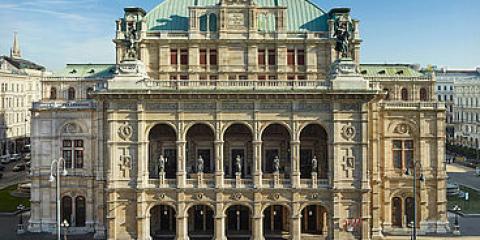-
Opernring 11010 Wien
Le Grand Macabre State Opera Vienna - Wien Sun 15.Mar 2026 19:00 replace me !Le Grand Macabre State Opera Vienna - Wien Fri 20.Mar 2026 19:00 replace me !Le Grand Macabre State Opera Vienna - Wien Sun 22.Mar 2026 19:00 replace me !Le Grand Macabre State Opera Vienna - Wien Wed 25.Mar 2026 19:00 replace me !One day, Death, alias Necrotzar, alias the demonic Great Macabre, bursts into an imaginary, corrupt land of milk and honey - the »gluttonous, drunken and whorish« Breughelland.
He wants to proclaim the imminent destruction of the world and frivolous humanity. Seduced and overwhelmed by the unknown desires of life, only Nekrotzar himself dies in the end. Everyone else comes to the moral that their temporary survival should be used to maintain the way of life they have led until then.
The synaesthetically inclined Ligeti - he associated colors and shapes, machines, physical apparatuses with musical processes and, conversely, sounds and noises with colors, words and letters - also sought »the total fusion of action and music« in Le Grand Macabre, i.e. a stage event through music. A deliberately crazy and »exaggerated music«, mind you, which is characterized by an orchestration that almost breaks the rules. In addition to the rather small string section, which represents the lyrical element, the instruments include a bass trumpet, harmonica, whistles, six doorbells and, last but not least, twelve differently tuned car horns, which open the opera like fanfares and symbolize the broken, unsteerable world of Breughelland on the one hand and are also remotely reminiscent of Monteverdi's Toccata to L'Orfeo on the other.The end of the world does not usually happen. With his only opera Le Grand Macabre, György Ligeti succeeded in creating a grand and discursive world theater in which the unvarnished human condition with all its drives and weaknesses brings down nothing less than an impending apocalypse.
György Ligeti's grotesque masterpiece, which premiered at the Royal Opera in Stockholm on April 12, 1978, is not only a central work in the oeuvre of the Austro-Hungarian composer, but has also become a permanent fixture in the repertoire worldwide. Through ironic distance, alienation and a continuous ambiguity that »takes the serious humorously and the comic deadly seriously«, the basic theme of the opera - the necessary abolition of fear and the triumph of Eros - is unfolded before the eyes and ears of the audience.(Source: wiener-staatsoper.at)
Navigation:
- shopping-cart ({{mainCartInfo.itemCount}})
-
- venues
- Genres
- language:

